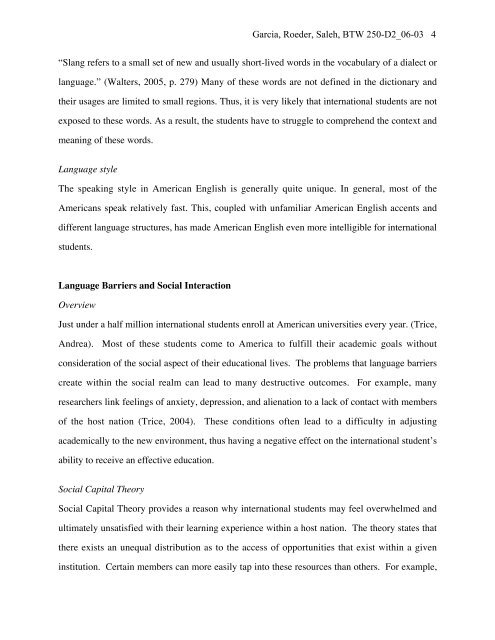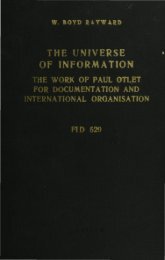Language Barriers in the University of Illinois Urbana ... - ideals
Language Barriers in the University of Illinois Urbana ... - ideals
Language Barriers in the University of Illinois Urbana ... - ideals
Create successful ePaper yourself
Turn your PDF publications into a flip-book with our unique Google optimized e-Paper software.
Garcia, Roeder, Saleh, BTW 250-D2_06-03 4<br />
“Slang refers to a small set <strong>of</strong> new and usually short-lived words <strong>in</strong> <strong>the</strong> vocabulary <strong>of</strong> a dialect or<br />
language.” (Walters, 2005, p. 279) Many <strong>of</strong> <strong>the</strong>se words are not def<strong>in</strong>ed <strong>in</strong> <strong>the</strong> dictionary and<br />
<strong>the</strong>ir usages are limited to small regions. Thus, it is very likely that <strong>in</strong>ternational students are not<br />
exposed to <strong>the</strong>se words. As a result, <strong>the</strong> students have to struggle to comprehend <strong>the</strong> context and<br />
mean<strong>in</strong>g <strong>of</strong> <strong>the</strong>se words.<br />
<strong>Language</strong> style<br />
The speak<strong>in</strong>g style <strong>in</strong> American English is generally quite unique. In general, most <strong>of</strong> <strong>the</strong><br />
Americans speak relatively fast. This, coupled with unfamiliar American English accents and<br />
different language structures, has made American English even more <strong>in</strong>telligible for <strong>in</strong>ternational<br />
students.<br />
<strong>Language</strong> <strong>Barriers</strong> and Social Interaction<br />
Overview<br />
Just under a half million <strong>in</strong>ternational students enroll at American universities every year. (Trice,<br />
Andrea). Most <strong>of</strong> <strong>the</strong>se students come to America to fulfill <strong>the</strong>ir academic goals without<br />
consideration <strong>of</strong> <strong>the</strong> social aspect <strong>of</strong> <strong>the</strong>ir educational lives. The problems that language barriers<br />
create with<strong>in</strong> <strong>the</strong> social realm can lead to many destructive outcomes. For example, many<br />
researchers l<strong>in</strong>k feel<strong>in</strong>gs <strong>of</strong> anxiety, depression, and alienation to a lack <strong>of</strong> contact with members<br />
<strong>of</strong> <strong>the</strong> host nation (Trice, 2004). These conditions <strong>of</strong>ten lead to a difficulty <strong>in</strong> adjust<strong>in</strong>g<br />
academically to <strong>the</strong> new environment, thus hav<strong>in</strong>g a negative effect on <strong>the</strong> <strong>in</strong>ternational student’s<br />
ability to receive an effective education.<br />
Social Capital Theory<br />
Social Capital Theory provides a reason why <strong>in</strong>ternational students may feel overwhelmed and<br />
ultimately unsatisfied with <strong>the</strong>ir learn<strong>in</strong>g experience with<strong>in</strong> a host nation. The <strong>the</strong>ory states that<br />
<strong>the</strong>re exists an unequal distribution as to <strong>the</strong> access <strong>of</strong> opportunities that exist with<strong>in</strong> a given<br />
<strong>in</strong>stitution. Certa<strong>in</strong> members can more easily tap <strong>in</strong>to <strong>the</strong>se resources than o<strong>the</strong>rs. For example,
















